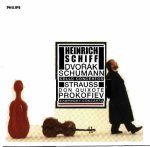Re-issued to mark Schiff’s 50th birthday, these are in the main admirable performances, despite Schiff’s sometimes detached manner. There could, for example, be a more sweetly nostalgic feel to the epilogue of the Dvoøák concerto, or closing pages of Strauss’s “Don Quixote”. But Schiff’s account of the Dvoøák’s opening movement is often very impressive. His first entry is gripping; the multiple-stopped chords sound massive, but later you’ll miss Yo-Yo Ma’s lighter touch in the string crossings just after the cello plays the second subject. Incidentally, how hauntingly the Concertgebouw’s first horn announces it during the orchestral exposition. Ma sounds more alluring in the slow movement, but Davis drives the music harder than Maazel in the unsettled middle section, finding greater idiomatic contrasts. Schiff, though, sounds plainer than Ma in the accompanied cadenza, where again the horns are superb. His partnership with Masur in “Don Quxote” is predictably assured, but limited on imagination and pictorialism. Masur is far less illustrative than Maazel (with Isserlis on RCA), and his thinner-sounding Leipzig oboist isn’t so captivating a Dulcinea as his Bavarian Radio rival, especially in Variation 6. Schiff plays in a straighter, quite uncomplicated way, but displays some sophistication, too (try Variations 2, 7, and 9), but Stephen Isserlis is more penetrating, and his recording has better violin and viola soloists, too.
Prokofiev’s Symphony-Concerto suits Schiff’s incisive playing best of all. The central scherzo displays his virtuosity to the fullest, and Previn’s accompaniments match him perfectly. The horns, and especially the solo winds impress here, too. In the Schumann concerto, you might find Rostropovich or Ma more eloquent, at least in the first movement, where Schiff’s presentation of the first theme seems lacking in tension. But instead of Rostropovich’s abrupt pull-ups or Ma’s over-ripe, over-sweet tone, Schiff gives you just what’s written, including all the dynamics. His dialogue with the orchestra’s first cellist in the middle movement is nicely done, but the finale (in which Schiff’s crisp staccato attack punches out high register passages with maximal force) is superb. Two outstanding performances then, plus two others which are highly accomplished, if not completely satisfying. The recordings match Philips’ best. .
































